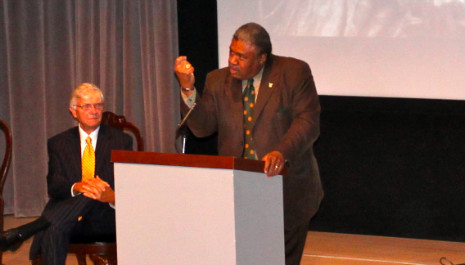August 2009: Law School Welcomes Class of 2012, Judge Thomas Shares Story of His "Journey in the Law"
William & Mary Law School's newest students began their orientation to law school on Aug. 17 at a welcome event hosted by Dean Davison M. Douglas and held in Colonial Williamsburg's Dewitt Wallace Museum.
Douglas began the program by welcoming students to the "first day of a wonderful adventure," the beginning of their journey to becoming lawyers. He saw himself as sharing a special bond with them, he said, as he began his term as dean earlier in the summer.
In his remarks, he sketched the story of the founding of the first law school in America at William & Mary more than two centuries ago. The naming of George Wythe, one of the leading lawyers in the colonies, to the nation's first professorship of law in 1779 marked the beginning of the training of lawyers in a university setting. It was, Douglas said, "a pivotal moment, not just in legal education," but also a "pivotal moment in the role of lawyers in our society."
Up to that time, Douglas explained, young men who wished to become lawyers learned law under the tutelage of a mentor. Wythe mentored Thomas Jefferson through a rigorous plan of study that reflected his vision that "lawyers should have a broad education" to prepare them for leadership. For Jefferson, Wythe "prescribed an extraordinarily ambitious reading program ... that included not just the standard English legal texts of the day. He had Jefferson read ethics and moral philosophy, history, art, classical literature and the Bible."
Jefferson later became governor of Virginia and as part of his duties became a member of the College's Board of Visitors (the equivalent of a Board of Trustees). It was through this latter role, said Douglas, that Jefferson was able to bring his own vision to fruition for "preparing people to engage in self-governance" and also prepare lawyers for leadership in the fledgling nation. Jefferson's reorganization of the College's faculty included the creation of a professorship of law, to which he named his mentor George Wythe.
"Wythe's and Jefferson's vision about the training of lawyers and the role that lawyers would play in society ... is a vision carried on today at the Law School," said the Dean. " He told students that "in the spirit of Wythe and in the spirit of Jefferson" they should endeavor to use the legal skills they would gain not just in the service of their own interests but also in service to their communities, states and nation.
William & Mary President and former Law School Dean Taylor Reveley was on hand to lead the students in the taking of the Honor Code Oath.
"One of the salient characteristics" of the Law School, Reveley said, "is that people trust one another. There is pervasive trust, pervasive integrity at William &Mary Law School."
Professor Patricia Roberts, Director of Legal Skills and Clinical Programs, and a graduate of the Law School, also spoke to the students. She compared the first days of law school to the first days of a marriage, filled with a sense of anticipation and promise.
She urged the students to write down at the end of that day "why you chose this profession, why you are on this path. Keep it somewhere close where you can refer to it often, and be reminded of today's excitement."
"If you remember each morning why you chose to come to law school, this will be a career that sustains your spirit."
The event closed with a powerful message from former Virginia Supreme Court Justice John Charles Thomas. In his introduction of Justice Thomas, the Dean noted the many distinctions of Thomas's legal career. He was, for example, the youngest person and first African American ever appointed to the Commonwealth's highest court. He also is renowned as a "master litigator and appellate advocate ... and much sought-after mediator and arbitrator." Currently, he is a Senior Partner with Hunton & Williams.
Justice Thomas said during his nearly forty-year "journey in the law" he had learned what the law is and isn't.
"The law is about the struggle of people to be free," he told the audience, not the winner-take-all legal services advertised on television and the "business of tearing things down."
The racial diversity of the students inspired him to reflect on the America of a not-so-distant time "in which it was against the law for an American law school to look like this class does today."
He eloquently reminded the students that the law can be twisted to become an instrument for injustice or it can be used to promote equality and fairness.
"If you bring hate to the law, the law is going to be a tool for hatred. If you bring violence to the law, the law is going to be a tool for violence. ... But if you want to heal with the law, if you want to unite with the law, if you want to harmonize with the law, the law will do those things as well, because it is all about you."
